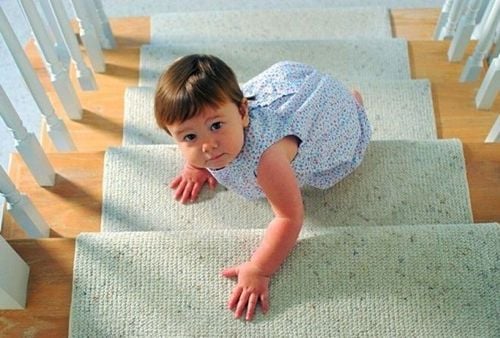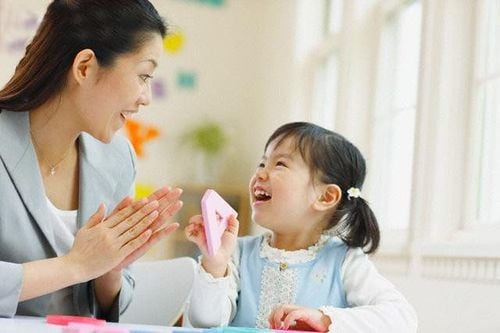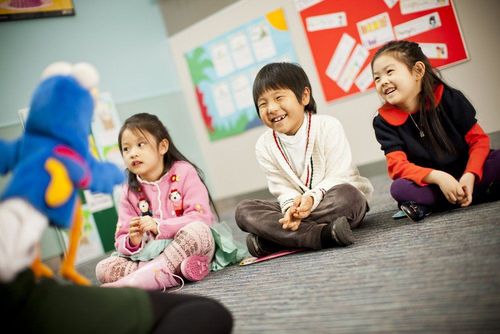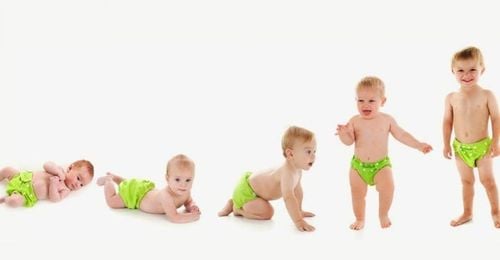This is an automatically translated article.
The article was professionally consulted with Specialist Doctor I Bui Thi Ha - Pediatrician - Neonatologist - Department of Pediatrics - Neonatology - Vinmec Ha Long International General Hospital.Any parent has a lot of questions and expectations when caring for a 2-year-old. It is common for babies to start walking, talking and doing all the cute things like the rest of them. So what exactly does a 2-year-old know how to do?
1. First steps
The first toddler steps - one of the most important milestones for a child at this stage, usually comes at the beginning of the second year. Your child can now walk without help, but will be quite wobbly at first, then gradually become more steady. Most children start to walk around 9-17 months of age, with an average age of about 14 months. Gradually, children can pull toys behind or carry large toys while walking.You can refer to the article: Teaching toddlers to walk: Things to know
2. Run around
Many parents joke that this is when "the race begins". About 6 months after taking their first toddler steps, babies will move into the running phase. Parents should be prepared because soon you won't be able to keep up with your child.
3. Climbing
Your child will really start to explore as soon as she realizes that she can stand on tiptoe when she wants to reach for something, and she can even climb up. Your baby will climb stairs and onto furniture - and in some cases climb out of a crib that used to be a very safe place. Children also know how to hold the stairs when going up and down to avoid falling.However, parents still need to prepare enough necessary knowledge to protect their children during this period. Watch carefully when caring for 2-year-olds, if your baby can almost climb out of the crib, stop using them.

4. Kick the ball
From the moment a child starts to stand on tiptoe to the moment he kicks a ball is a big step. Young children need coordination to kick, plus the ability to predict whether the ball will roll or fly high after that kick. If your child discovers that the ball can bounce, too, he's more likely to throw toys, food, and other objects to see if they do the same.5. Write and doodle
It's still too early to tell if your child is truly artistic, but his first doodles are invaluable to parents.During the second year, children can develop better control of the small muscles in their hands and fingers. These are known as fine motor skills, which enable 2-year-olds to write or doodle with crayons, as well as use spoons/spoons when eating, and turn bottles/jars caps to empty the contents. Your baby can use one hand more than the other, then you will also know which is your child's dominant hand.

6. Role play
Your child's imagination is getting closer to life. Between 18 and 24 months, a 2-year-old's brain is ready to begin pretend play. You might have your little girl feeding a teddy bear, or a boy talking to a toy phone. Parents should support, participate and imagine with their children in these games because it will help them develop other necessary skills.7. Talk
Currently, many people think that the baby is just saying "babble", aimlessly and randomly without meaning at all. But in fact, at about 15-18 months, parents can learn what a 2-year-old can say and expect to hear words that really mean it. Between 18-24 months, most children start using simple phrases, like "it's over!" or "what is this?", or repeating words you hear in adult conversation. By age 2, you may even be able to hear 1-2 short sentences coming out of your child's mouth.
8. Play with friends
At the age of 3, most children express an interest in meeting and playing with other children. Naturally, children at this age are often selfish and difficult to grasp the mood, sometimes happy, sociable, sometimes angry, sad. Your baby may not be ready to share all of her toys with others, but this is a big step towards establishing those first social connections. If possible, parents should regularly take their children to the park to play, helping them integrate into the natural environment and surrounding friends.Parents' parenting methods greatly contribute to the development of children in the early stages of life, as well as affect what 2-year-olds know what to do, what 2-year-olds can say. To help your child form good and obedient habits, let your child participate in simple everyday things, don't forget to give praise, teach him to share toys, and show him the difference. and encourage naming of common body parts, animals and objects...
To help children reach important developmental milestones. In addition to the nutritional diet, parents should supplement their children with supporting products containing lysine, essential micro-minerals and vitamins such as zinc, chromium, selenium, and B vitamins to help fully meet their nutritional needs. in children. At the same time, these essential vitamins also support digestion, enhance nutrient absorption, help improve anorexia, help children eat well, and develop comprehensively.
Please regularly visit Vinmec.com website and update useful information to take care of your baby and family.
Please dial HOTLINE for more information or register for an appointment HERE. Download MyVinmec app to make appointments faster and to manage your bookings easily.
Reference source: webmd.com













